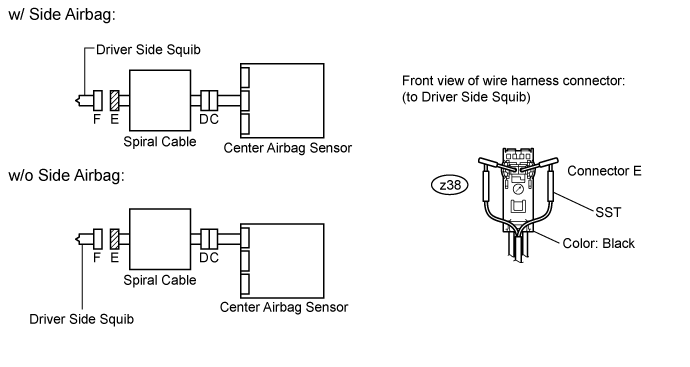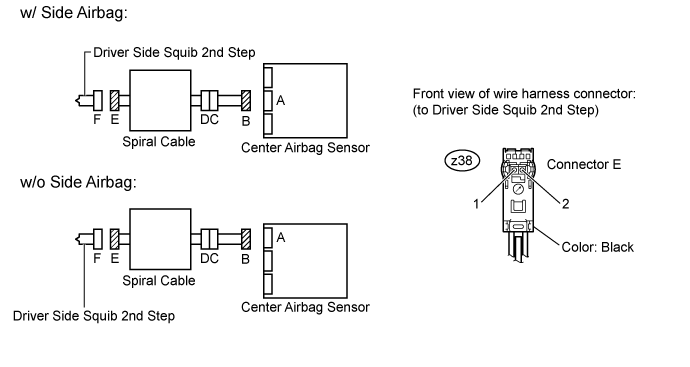Land Cruiser URJ200 URJ202 GRJ200 VDJ200 - SUPPLEMENTAL RESTRAINT SYSTEMS
CHECK STEERING PAD (DRIVER SIDE SQUIB 2ND STEP)
CHECK DRIVER SIDE SQUIB 2ND STEP CIRCUIT
CHECK INSTRUMENT PANEL WIRE (CENTER AIRBAG SENSOR - SPIRAL CABLE)
DTC B1810/53 Short in Driver Side Squib 2nd Step Circuit
DTC B1811/53 Open in Driver Side Squib 2nd Step Circuit
DTC B1812/53 Short to GND in Driver Side Squib 2nd Step Circuit
DTC B1813/53 Short to B+ in Driver Side Squib 2nd Step Circuit
DESCRIPTION
The driver side squib 2nd step circuit consists of the center airbag sensor, the spiral cable, and the steering pad.
The circuit instructs the SRS to deploy when deployment conditions are met.
These DTCs are stored when a malfunction is detected in the driver side squib 2nd step circuit.
| DTC Code | DTC Detection Condition | Trouble Area |
| B1810/53 | When one of the following conditions is met: The center airbag sensor receives a line short circuit signal 5 times in the driver side squib 2nd step circuit during the primary check. A driver side squib 2nd step malfunction. A spiral cable malfunction. A center airbag sensor malfunction. |
Instrument panel wire Spiral cable Steering pad (Driver side squib 2nd step) Center airbag sensor assembly |
| B1811/53 | When one of the following conditions is met: The center airbag sensor receives an open circuit signal in the driver side squib 2nd step circuit for 2 seconds. A driver side squib 2nd step malfunction. A spiral cable malfunction. A center airbag sensor malfunction. |
Instrument panel wire Spiral cable Steering pad (Driver side squib 2nd step) Center airbag sensor assembly |
| B1812/53 | When one of the following conditions is met: The center airbag sensor receives a short circuit to ground signal in the driver side 2nd step circuit for 0.5 seconds. A driver side squib 2nd step malfunction. A spiral cable malfunction. A center airbag sensor malfunction. |
Instrument panel wire Spiral cable Steering pad (Driver side squib 2nd step) Center airbag sensor assembly |
| B1813/53 | When one of the following conditions is met: The center airbag sensor receives a short circuit to B+ signal in the driver side squib 2nd step circuit for 0.5 seconds. A driver side squib 2nd step malfunction. A spiral cable malfunction. A center airbag sensor malfunction. |
Instrument panel wire Spiral cable Steering pad (Driver side squib 2nd step) Center airbag sensor assembly |
WIRING DIAGRAM

INSPECTION PROCEDURE
- NOTICE:
- HINT:
- To perform the simulation method, enter the check mode (signal check) with the intelligent tester (), and then wiggle each connector of the airbag system or drive the vehicle on various type of road ().
| 1.CHECK STEERING PAD (DRIVER SIDE SQUIB 2ND STEP) |
Turn the ignition switch off.

Disconnect the cable from the negative (-) battery terminal, and wait for at least 90 seconds.
Disconnect the connectors from the steering pad.
Connect the white wire side of SST (resistance: 2.1 Ω) to connector E (black connector).
- CAUTION:
- Never connect the tester to the steering pad (driver side squib 2nd step) for measurement, as this may lead to a serious injury due to airbag deployment.
- NOTICE:
- SST
- 09843-18061
Connect the cable to the negative (-) battery terminal, and wait for at least 2 seconds.
Turn the ignition switch to ON, and wait for at least 60 seconds.
Clear the DTCs ().
Turn the ignition switch off.
Turn the ignition switch to ON, and wait for at least 60 seconds.
Check for DTCs ().
- OK:
- DTC B1810, B1811, B1812 or B1813 is not output.
- HINT:
- Codes other than DTC B1810, B1811, B1812 and B1813 may be output at this time, but they are not related to this check.
|
| ||||
| OK | ||
| ||
| 2.CHECK CONNECTOR |
Turn the ignition switch off.
Disconnect the cable from the negative (-) battery terminal, and wait for at least 90 seconds.
Disconnect SST from connector E.
Check that the spiral cable connectors (on the steering pad side) are not damaged.
- OK:
- The lock button is not disengaged, and the claw of the lock is not deformed or damaged.
|
| ||||
| OK | |
| 3.CHECK DRIVER SIDE SQUIB 2ND STEP CIRCUIT |
Disconnect the connectors from the center airbag sensor.

Connect the cable to the negative (-) battery terminal, and wait for at least 2 seconds.
Measure the voltage according to the value(s) in the table below.
- Standard Voltage:
Tester Connection Switch Condition Specified Condition z38-1 - Body ground Ignition switch ON Below 1 V z38-2 - Body ground Ignition switch ON Below 1 V
Turn the ignition switch off.
Disconnect the cable from the negative (-) battery terminal, and wait for at least 90 seconds.
Measure the resistance according to the value(s) in the table below.
- Standard Resistance:
Tester Connection Condition Specified Condition z38-1 - z38-2 Always Below 1 Ω
Release the activation prevention mechanism built into connector B ().
Measure the resistance according to the value(s) in the table below.
- Standard Resistance:
Tester Connection Condition Specified Condition z38-1 - z38-2 Always 1 MΩ or higher z38-1 - Body ground Always 1 MΩ or higher z38-2 - Body ground Always 1 MΩ or higher
|
| ||||
| OK | |
| 4.CHECK CENTER AIRBAG SENSOR |

Connect the connectors to the steering pad and the center airbag sensor.
Connect the cable to the negative (-) battery terminal, and wait for at least 2 seconds.
Turn the ignition switch to ON, and wait for at least 60 seconds.
Clear the DTCs ().
Turn the ignition switch off.
Turn the ignition switch to ON, and wait for at least 60 seconds.
Check for DTCs ().
- OK:
- DTC B1810, B1811, B1812 or B1813 is not output.
- HINT:
- Codes other than DTC B1810, B1811, B1812 and B1813 may be output at this time, but they are not related to this check.
|
| ||||
| OK | ||
| ||
| 5.CHECK INSTRUMENT PANEL WIRE (CENTER AIRBAG SENSOR - SPIRAL CABLE) |
Restore the released activation prevention mechanism of connector B to its original condition.

Disconnect the instrument panel wire connector from the spiral cable.
Connect the cable to the negative (-) battery terminal, and wait for at least 2 seconds.
Measure the voltage according to the value(s) in the table below.
- Standard Voltage:
Tester Connection Switch Condition Specified Condition E13-4 (D2+) - Body ground Ignition switch ON Below 1 V E13-3 (D2-) - Body ground Ignition switch ON Below 1 V
Turn the ignition switch off.
Disconnect the cable from the negative (-) battery terminal, and wait for at least 90 seconds.
Measure the resistance according to the value(s) in the table below.
- Standard Resistance:
Tester Connection Condition Specified Condition E13-4 (D2+) - E13-3 (D2-) Always Below 1 Ω
Release the activation prevention mechanism built into connector B ().
Measure the resistance according to the value(s) in the table below.
- Standard Resistance:
Tester Connection Condition Specified Condition E13-4 (D2+) - E13-3 (D2-) Always 1 MΩ or higher E13-4 (D2+) - Body ground Always 1 MΩ or higher E13-3 (D2-) - Body ground Always 1 MΩ or higher
|
| ||||
| OK | ||
| ||